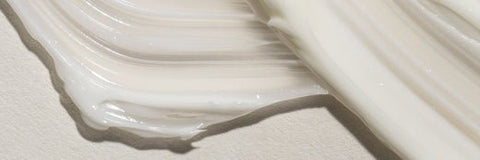When it comes to skin care, Mother Nature knew what she was doing. There’s no need for toxic chemicals when our planet is plentiful with botanical ingredients that can make your skin radiant, healthy, and ageless.
Jojoba (pronounced ‘ho-HO-ba’) oil is one such wonder plant. Derived from the seeds of a hearty Southwestern shrub, jojoba is actually a wax that’s very similar to the oil (known as sebum) in your own skin.
Keep reading for 10 reasons to use jojoba oil, what jojoba oil is and where it originates, how to use jojoba oil and for what skin types, and answers to all of your burning questions about jojoba oil. We’ve also put together a short video giving you all the deets on jojoba oil for the skin.
IN A NUTSHELL
Ingredient Category: Oil/emollient, occlusive.
Main Benefits: Jojoba oil softens, smooths, and hydrates your skin without clogging your pores.
Find It In: Nectar of the C Vitamin C Serum, Just Dew It Hydrating Serum, ‘A’ Game Retinol Serum, H2 Oh Yeah Hydrating Moisturizer, Youth Fairy Retinol Moisturizer, Crème de la Cream Brightening Moisturizer, and Prince Charcoal Detox Mask.
What is Jojoba Oil?
Jojoba oil comes from the seeds of a hearty, evergreen Southwestern shrub known as the Simmondsia chinensis plant. The desert shrub originally comes from southern Arizona, southern California, and northwestern Mexico.
Straight from the seed, jojoba oil has a bit of a nutty smell, but once refined for use in skin care (and other) products, it’s colorless and odorless. It has a rich skin care history and has been used by Native Americans for generations to treat wounds.
As we mentioned, it’s really a wax versus an oil — but it’s generally referred to as jojoba oil.
Jojoba Oil Benefits: 10 Reasons to Use
1. It adds moisture.
Jojoba oil has a waxy nature that almost exactly mimics the sebum that your skin creates on its own. That makes jojoba oil for skin a perfect fit for moisturizing purposes. Essentially it forms a protective layer on top of your skin that holds water in place, keeping your skin from drying out.
2. It contains antioxidants and other nutrients.
Jojoba oil is rich in the skin-nourishing antioxidant Vitamin E, plus Vitamins A and D. It also contains the minerals chromium, copper, and zinc, plus Omega 6 and 9 fatty acids. All good-for-you stuff that will plump up your skin and help keep it healthy.
3. It’s non-comedogenic.
Even though it’s an oil, jojoba oil is known to be non-comedogenic, so it won’t clog pores.
4. It helps soothe skin.
As mentioned above, jojoba oil contains soothing Vitamin E and B-complex vitamins that can alleviate temporary redness, discomfort and irritation.
5. It is non-irritating.
For the same reason that it soothes the skin, jojoba oil is less likely to cause sensitivity and irritation. As with any new ingredient, it’s worth testing it first to see how it reacts with your skin.

6. It helps balance natural oils.
Because jojoba oil is so similar to your skin’s sebum, your skin accepts it as part of its own supply and doesn’t overproduce oil, resulting in balanced skin
7. It can help keep your skin clear.
Because jojoba oil has the unique ability to balance the oil in your skin (regardless of skin type) and is non-comedogenic, it can help keep pores from clogging, therefore minimizing the appearance of pores.
8. It can slow signs of aging.
Rich in antioxidants and other nutrients, the benefits of jojoba oil include looking younger, longer. It can even help reduce the appearance of wrinkles. It gives your skin the boost it needs to remain plump and firm as your skin ages.
9. It can help protect your skin.
Jojoba oil is also a humectant, meaning it adds a protective layer to your skin that keeps moisture in.
10. It can remove your makeup.
Oil actually does a better job of eliminating makeup residue than soap and water, so it can serve multiple purposes in your skin care routine. Simply add a few drops to a cotton ball or pad and gently wipe away all traces of makeup, or massage a small amount onto damp skin as a precleanse.

How to Use Jojoba Oil for Your Face
There are an array of different ways to help maximize the benefits of jojoba oil for your skin — both on your face and body.
When deciding to use jojoba oil, opt for a 100% pure version. You want the real deal — no additives or toxins.
Here’s one way to use jojoba oil:
1. Cleanse your skin with a natural face wash.
2. Use toner.
3. Apply any other serums or treatments.
4. Put a few drops of jojoba oil on your fingertips and apply to your face and neck.
5. Apply sunscreen (during the daytime).
You can also apply jojoba oil to your body, but if your skin has a tendency to be dry, it may absorb too quickly. We recommend applying it right after a shower while your skin is still damp, then follow up with shea butter on top as an extra layer of protection.
Clean beauty products like moisturizers, facial oils and serums, cleansers and masks — and even lipsticks and nail care products — often contain jojoba oil. All of Fleur & Bee’s facial serums, including our vitamin C serum, contain jojoba oil to help boost the serum’s potency and to soften, nourish, and condition your skin. Because it’s a natural moisturizer that mimics the oil our skin produces and works with all skin types, it’s a perfect base ingredient for a serum.
What Skin Type Is it Good for?
There are four different standard skin types. Here’s a breakdown of how jojoba oil works for each.
Sensitive: The benefits of jojoba oil include that it’s soothing and gentle, which means it’s usually a good fit for someone with sensitive skin.
Oily: As we mentioned before, jojoba oil for skin can actually help balance natural oils, so it’s great for oily skin. It won’t clog pores and can help keep skin clean and clear.
Dry: Because jojoba oil has moisturizing properties and the ability to help your skin retain water, it can be a great skin care addition for those with dryness issues.
Combination: Since jojoba oil balances the natural oils in your skin, it’s also great for combination skin. Because of its unique properties that mimic our own skin’s oil, it serves to either increase or decrease moisture depending on what your skin needs most.
Just remember that every individual is different, so we always recommend spot testing any new product to see how it reacts with your unique skin.
Frequently Asked Questions About Jojoba Oil
Is jojoba oil good for your face?
Yes, with the many benefits of jojoba oil, it can be an excellent addition to your facial skin care routine. It offers soothing, renewing, and moisturizing and non-comedogenic properties. It makes a great ingredient in natural skin care products for all the reasons discussed above.
What is jojoba oil best for?
Jojoba oil is an extremely effective natural moisturizer. It’s best used on the face and neck as part of a skin care routine. It works for all skin types and is great for nourishing, hydrating and soothing skin.
Does jojoba oil clog pores?
Jojoba oil is considered generally non-comedogenic so it’s very unlikely to clog pores. But keep in mind that everyone’s skin is different, so you’ll need to try it to see how it works for you.
Is jojoba oil safe?
Jojoba oil is a completely natural and clean ingredient that comes from a desert shrub. It’s safe to use on skin, hair, or cuticles. While it’s also technically edible, it would pass right through your system so it makes the most sense to use it topically. Just make sure you’re looking for a reputable source of the oil, so you can be sure it’s pure.
Is jojoba oil safe when pregnant?
Yes! Jojoba oil is not linked to any risks while pregnant and is considered hypoallergenic. We still recommend checking with your doctor for any questions related to pregnancy.
Can jojoba oil go bad?
No, if stored properly jojoba oil does not oxidize and has an indefinite shelf life. Because it’s waxy and odorless, it won’t go rancid like many other oils. Ideally it should be stored in sealed, dark glass bottles away from the light.
Which is best: Jojoba oil vs argan oil vs rosehip oil?
Jojoba, argan, and rosehip oils are all popular for skin care. Which one is best for you depends on your skin’s unique needs. Generally, jojoba oil is best for all different skin types due to its ability to balance oil; argan oil is best for oily, blemish-prone skin; and rosehip oil is best for dry skin.
Should jojoba oil be refrigerated?
No, jojoba oil is shelf stable and can last an extremely long time when sealed and stored properly.










